Dear friends, we are going to discuss English Grammar in detail. In this page we will discuss the definition of Noun in English grammar, its Classifications. We will also deal with the various types of Noun in detail. So, your response in our endeavour will encourage us to do something innovative in the field of English grammar. We have discussed and designed this page keeping in mind the need of the students wanting to learn English from the very beginning. We are trying to give the basic concept about noun. So, this page is very helpful to those students who are going sit for various types of competitive examinations.
What is Noun or What is the definition of Noun?
Noun is a word that gives the name of any object, any person, any place, any quality etc.
Actually ‘Noun’ has come from a Latin word ‘Nomen’. Nomen means Name.

Noun কাকে বলে?
Noun এর বাংলা হলো বিশেষ্য পদ। যে সব word বা শব্দ কোনো বস্তু বা ব্যক্তি বা কোনো জায়গা বা কোনো গুণের নাম বলে সেই সমস্ত word কে Noun বা বিশেষ্য পদ বলে।
এর দ্বারা কোনো ব্যক্তির, বস্তুর, পদার্থের, প্রাণীর, সমষ্টির, দোষ বা গুণের নাম বোঝানো হয়।
So, we can say, Noun is a naming word. What names something or someone is called a noun. অর্থাৎ Noun হলো একটি নাম বাচক শব্দ। যা কোনো কিছুর নাম প্রকাশ করে তাই হলো Noun. So, it gives the name of a person, a thing, a material, a quality, or a group.
Classification of Noun: (Noun এর শ্রেণী বিভাগ)
In English grammar, Nouns are classified into five (5) groups. They are –
(Noun হলো পাঁচ প্রকার। সেগুলো হলো) –
1. Proper Noun
2. Common Noun
3. Collective Noun
4. Material Noun
5. Abstract Noun
Now we will discuss minutely each and every noun in detail.
1. Proper Noun: (ব্যক্তি বাচক বিশেষ্য পদ)
The noun which gives the proper name of any thing, any person or any place is called Proper Noun.
Proper Noun কোনো ব্যক্তি, বস্তু, নদ-নদী, স্থান, পাহাড়-পর্বত, সাগর ইত্যাদির নিজের নাম বোঝায়।
For example, Ram, Shyam, Jadu, Ramu, Ganges, Mount Everest, The Ramayana, The Statesman, The Victoria, Kolkata, The Statesman etc.
Then, here we can say that Ram is the name of a boy. Ram is his original name or proper name. So, Ram is the Proper Noun here.
*Wherever a Proper Noun is placed in a sentence, it takes Capital Letter. Generally Proper Noun is not used as plural, but there are some exceptions.
*Proper Noun does not generally take any article (a/an/the), but it also has exception.
*Article is used before Proper Noun to compare. (Example- Darjeeling is the London of India.)
*We also can use The before Proper Noun, it The is a part of that Proper Noun. (The Statesman)
2. Common Noun: (জাতি বাচক বিশেষ্য পদ)
The noun which gives the name of a group of any animal or object of same group is called Common Noun. It does not indicate any particular name of any animal or object. It gives the common name of any kind.
For example – person, friend, boy, girl, animal, chair, mountain, man, river, hill, bird, goat, cow, house, picture, comb, book, ship, bird etc.
Common Noun কোনো বিশেষ ব্যক্তি বা বস্তু বা প্রাণীর নাম বোঝায় না, তার জাতিকে বোঝানো হয়।
3. Collective Noun: (সমষ্টি বাচক বিশেষ্য পদ)
The noun which indicates of a group of people or animals or objects collectively is called Collective Noun.
For example- committee, army, herd, flock, shoal, group, the gentry, jury, team, etc.
Collective Nouns always take plural verb. But it also has exception. When Collective Noun is taken as a single unit, it takes a singular verb.
4. Material Noun: (বস্তু বাচক বিশেষ্য পদ)
The noun which gives the name of any matter (পদার্থ) or material is called Material Noun.
যে Noun কোনো পদার্থ বা বস্তু বা উপাদান বা ধাতুর নাম বোঝায় তাকে Material Noun বা বস্তু বাচক বিশেষ্য পদ বলে।
For example – Iron (লৌহ), silver (রূপা), gold (সোনা), sugar(চিনি), butter (মাখন), milk (দুধ), diamond (হিরে), water (জল), paper (কাগজ), mud (কাদা) etc.
*Material Nouns are generally plural. (Material Noun সাধারণত: বহুবচন হয়)
* Material Nouns may take Definite Article (the) before them. But Material Noun does not take Indefinite Article (a/an).
5. Abstract Noun: (গুণ বাচক বিশেষ্য পদ)
The noun which gives the name of any quality, any fault, condition or work is called Abstract Noun. Such qualities are to be felt, they cannot be touched with our senses.
যেসব Noun – এর দ্বারা কোনো দোষ বা গুণ (- এর নাম) প্রকাশ করা হয় তাদের Abstract Noun (অ্যাবস্ট্রাক্ট নাউন) বা গুণবাচক বিশেষ্য পদ বলে।
For example – Beauty (সৌন্দর্য), strength (শক্তি), cruelty (নিষ্ঠুরতা), honesty (সততা), dishonesty (অসততা), love (ভালোবাসা), kindness (দয়া), happiness (সুখ), darkness (অন্ধকার), boyhood (শৈশব), freedom (স্বাধীনতা), poverty (দারিদ্র), movement (গতি) etc.
Abstract Noun এর দ্বারা গুণ, দোষ, অবস্থা বা কাজের নাম বোঝানো হয়। এই Noun গুলিকে আমাদের ইন্দ্রিয় (যেমন চোখ, কান, নাক, জীভ, ত্বক) ইত্যাদি দ্বারা অনুভব করা যায় না। এগুলিকে মন দিয়ে বা লোকের কাজের ভেতর দিয়ে উপলব্ধি করতে হয় মাত্র।
Thus, Abstract Noun takes singular verb and also plural verb.
Countable Noun and Uncountable Noun:
There are some nouns which can be counted. Such types of nouns are called Countable Nouns.
(যে সব Noun কে গোনা যায় তাদের Countable Noun বলা হয়।)
Example: books (বইগুলি), boys (বালক গুলি), girls (বালিকা গুলি), students (ছাত্র-ছাত্রী গুলি), balls (বল গুলি), dog (কুকুর), man (মানুষ), school (বিদ্যালয়), fan (পাখা) etc.
On the other hand, some nouns cannot be counted. So, Such types of nouns are called Uncountable Nouns or Mass Nouns.
(যে সব Noun কে গোনা যায় না তাদের Uncountable Noun বলা হয়।)
Example: hair (চুল), milk (দুধ), grass (ঘাস), respect (শ্রদ্ধা), despair (হতাশা), happiness (সুখ), light (আলো) etc
আরও আপডেট পাওয়ার জন্য নিয়মিত ভিজিট করুন আমাদের ওয়েবসাইট onlineexamgroup.com
Visit and Like our Facebook Page Onlineexamgroup. Know more and enrich yourself.